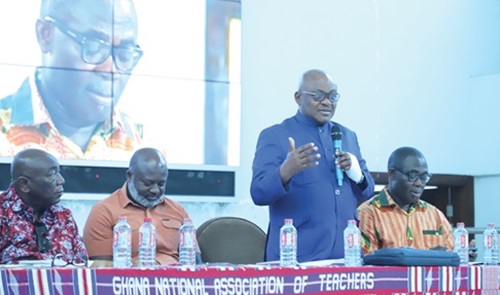An independent Emoluments Commission is to be set up by the end of this year, the acting Chief Executive of the Fair Wages and Salaries Commission (FWSC), Dr George Smith-Graham, has said.
He said action on the commission would be taken very soon and that he was waiting for the Constitutional Review Committee to finish its work.
When established, it would deal with political interference in salary setting, harmonising Article 71 and non-Article 71 holders.
"A lot of the work has been done, and consultative processes would begin, and I'm sure that it should be possible that by the end of the year we establish the independent emoluments commission," he said.
Response
Dr Smith-Graham said this in response to a question on the timelines for the establishment of the commission at a pre-May Day Forum in Accra yesterday.
The event, organised by the Trades Union Congress (TUC), was on the theme: "Resetting Pay and Working Conditions in Ghana: The Role of Stakeholders.
Dr Smith-Graham said in order to reset pay in the public sector and deepen the institutionalisation of fairness and transparency, the President was proposing the establishment of an independent emoluments commission.
The independent commission, he said, had been on the drawing board for a very long time.
“Now what government wants to do is establish an independent emoluments commission that will bring Article 71 office holders, non-Article 71 office, all of us under the same policy so that when we negotiate, we know that whatever we are negotiating is also not only affecting us, but also affecting the President, is affecting the Vice-President, is affecting ministers, MPs, and everybody and that is what the government is proposing,” he emphasised.
In doing that, Dr Smith-Graham said a new enactment would have to be done and that the Fair Wages Act would be amended because the commission would become the constitutional body to determine salaries.
Living
Touching on the issues of the introduction of a living wage as stated by the Deputy General Secretary of the TUC, Dr Kwabena Nyarko Otoo, in his presentation, Dr Smith-Graham said, among other issues, that the implementation of such a wage was possible “but we can have it as part of our long-term plan as a country”.
“It’s doable, but it’s not something in my view can be done immediately, and so it is better that we look at it very carefully and plan towards it,” he said.
On the Single Spine Salary Structure (SSSS), Dr Smith-Graham said he was aware that it had been reviewed and that he would look at the recommendations adding that no matter what the recommendation was, due to the shift to the independent emolument commission, it would require major consensus building.????
He said the SSSS was implemented on a consensus basis with stakeholder engagement.
Dr Smith-Graham supported the idea of a National Productivity Week, saying that it could bring some awareness in order to help improve productivity within the public sector.
Per the little work he had done, he said, there was no institution in the public sector where productivity could not be measured, be it the medical field, the judiciary or the civil service.
Thus, he said it was possible to measure the productivity of the various institutions.
He said the event should be the beginning of a national consensus, not just on pay but on the values of public service in the dignity of work, adding that “Let us move policy talks to purposeful action and I believe that once we do that, together we can reset pay, together we can build trust, together we can deliver a better Ghana and together we would all be happy because the public service would have a more transparent and improved pay and conditions of service.”
Resetting
Dr Smith-Graham said resetting pay would be a strategic shift, a calibration of “our entire compensation philosophy to ensure fairness, transparency and alignment with our national development goals.”
Dr Otoo, in his presentation, stressed the need for the adoption of a living wage in the country as opposed to a minimum wage, and that “pay in both public and private sectors must be indexed to the level of inflation.
He said there would be a comprehensive review of the single spine and entire public sector compensation system, and that the objective must be to enhance pay and ensure equity.
In resetting pay, he said there was a need to formulate and adopt a more comprehensive pay policy for the public sector to cover all categories of public sector employees.
Dr Otoo said there was a need for a broad-banded grading structure to accommodate all public sector jobs and that there should also be a broad-banded integrated pay structure to accommodate all public sector job holders.
He said as part of the reset agenda of the President, “We need to reset pay and working conditions in Ghana”
The Secretary-General of the TUC, Joshua Ansah, said the current state of pay and working conditions demanded urgent attention.

